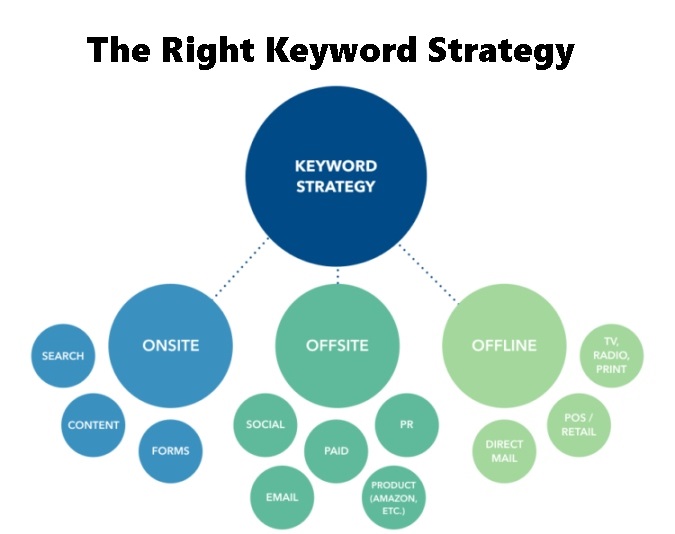

In SEO, a keyword strategy is a list of keywords important to your content or business and how to make them work better. It's like picking the words you want people to find when they search for information about your website.

To do this, you need to think of words or sentences that people might use to find content like yours. You can carefully use these keywords in your website's content, meta tags, and other parts once you've found them. This helps search engines figure out how relevant your material is to those queries, which increases your chances of moving up in the search results.
A well-thought-out keyword approach can help people find your website and bring them in. Like planting seeds in a garden: pick the right ones, take good care of them, and watch your online profile grow!
Okay, let's do it in steps:
1. Understand Your Audience:
Do a market study to find out who your ideal customers are.
You can learn about your users' demographics, interests, and behaviors by making user personas.
Please pay attention to the words and phrases they use every day.
2. Write down some ideas:
Find the main ideas or themes that run through your business or material.
These topics show what your business is all about and what your audience is interested in.
3. Add more with keywords:
To make a list of specific keywords linked to your chosen topics, use keyword research tools.
These tools tell you how often people look for your keywords, how much competition there is, and what kinds of variations there are.
4. Check how relevant the keywords are:
Check to see if each keyword is relevant to your business and fits with what people are looking for.
Think about how difficult the keyword is and whether your website can rank for it.

5. Look at competitor keywords:
Look at the websites of your competitors to see what keywords they are using to great effect.
Look for holes in their plan that you can fill or places to set yourself apart.
6. Keywords for Groups:
Sort buzzwords into groups based on what they have in common.
Putting things into groups like this makes the material more organized and focused.
7. Set priorities and choose:
Sort keywords by a mix of things, like how relevant they are, how often people look for them, and how much competition there is.
For a well-rounded plan, pick a mix of short-tail and long-tail terms.
8. Make content:
Create useful, interesting, and high-quality content based on your chosen keywords.
Make sure the content answers the questions and meets the wants of the people who will be reading it.
9. Improve elements on the page:
Naturally, use certain keywords like title tags, meta descriptions, headers, and body text.
Try to find a good mix between making your content search engine-friendly and easy for people to read.
10. Watch and Make Changes:
Track how well your keywords and SEO plan are doing with analytics tools.
Look at how users act, how many buy something, and other important data.
Based on the facts, change your strategy to get better results.
11. Set up backlinks:
Create useful, shared content that other websites want to link to to get backlinks.
To build a varied and trustworthy backlink profile, look for chances to guest post, form partnerships, or work with others.
12. Stay up to date:
Keep up with changes in business trends, search engine algorithms, and how people use your site.
To stay competitive in the digital world, keep your keyword strategy and SEO methods up to date regularly.
Remember that the point is not just to make your site better for search engines but also to give your readers useful information that hits home. This focus on the user is a key part of a good keyword plan.

Click-through rates (CTRs) can vary based on the platform or channel, the type of content, the industry, and the audience you want to reach. However, here are some broad guidelines to give you an idea:
1. Page that shows up in search engines (SERP):
The CTR for organic search results can be anywhere from 3% to 30% on average. The positions in the top few results usually have better CTRs.
2. Ads on Google:
Most of the time, Google Ads have a CTR of about 1.91% for the search network and 0.35% for the display network.
3. Marketing with email:
Email click-through rates (CTRs) change, but most of the time, they are between 1% and 5%. But this number can be higher for efforts that are very specific and tailored to each person.
4. The Internet:
Each social media site has a different CTR. About 0.90% of people who see ads on Facebook click on them. With an average CTR of about 1% to 2%, Twitter has a higher CTR.
5. Billboard ads:
Most of the time, banner ads have lower CTRs, usually between 0.1% and 0.5%. However, the results can differ depending on how the ad is designed and where it is placed.
Remember that these are just rough averages; your real CTR may be different. Also, the quality of the clicks and sales is more important than the CTR itself. Even if you have a high CTR, it might mean little if those clicks don't result in actions you want (like sales, sign-ups, etc.).
Always keep an eye on and analyze your CTRs, and think about them regarding your goals and the standards in your business. CTR can go up over time if you test and tweak your ads.
Many things can affect how far each keyword can reach, and it can take a lot of work to get a good estimate. But here are some things that can change how far a keyword might reach:
1. How Many Results:
Keywords that get a lot of searches tend to have a bigger possible reach because more people are looking for them.
2. The competition:
Because they are so famous, highly competitive keywords may have a wider reach, but it can take a lot of work to rank for them. Less competitive keywords might reach fewer people, but they might be easier to rank for.
3. Key Words: Long-Tail vs. Short-Tail
Long-tail keywords are more specific and get fewer searches, but they can attract a more specific audience. Short-tail keywords may be more difficult, but they can reach more people.
4. Business Type and Niche:
How far keywords can reach depends on the niche or business you're trying to reach. Some fields appeal to a wider range of people, while others are more specialized.
5. When to target locally vs. globally:
If your business only serves people in your area, using location-specific keywords may limit your reach. On the other hand, world-targeting keywords can reach more people.
6. Quality and usefulness of content:
Search engines will see and reach your keywords more easily if you have high-quality, useful content. Search engines usually give more weight to material that meets user intent.
7. Participation in social media:
If your keywords are part of a social media plan, things like engagement, shares, and retweets can change how far they can reach.
8. Advertising for money:
If you're paying for ads, you can use targeted ads on search engines and social media sites to make buzzwords more visible to more people.
You can use keyword study tools like Google Keyword Planner, SEMrush, or Ahrefs to determine how far a keyword might reach. These tools give you information about related keywords, search volume, and competition, which helps you make smart choices about your keyword approach.
Also Read: